World's most dangerous peacekeeping mission
- Published
Alastair Leithead: "The UN is being sucked into the kind of conflict that claimed so many British and American lives in Iraq and Afghanistan"
Suspected Islamist gunmen have attacked a hotel in Mali's capital, Bamako, where 170 people were staying. At least 18 people have been killed and most hostages rescued. The BBC's Alastair Leithead recently went on patrol with the UN's peacekeeping mission in the country, which has suffered more casualties than any other in recent years.
In the vast, lawless land north of the Malian city of Timbuktu, Saharan sand whipped up by the wind quickly covers the tracks of the smugglers and the traffickers, the arms dealers and the jihadists who thrive in one of the most inhospitable places on earth.
Centuries-old mud built mosques, crumbling ancient manuscripts, and weather-worn Tuareg nomads, their heads and faces wrapped in white cotton cloth, give Timbuktu its sense of other-worldly remoteness.
But Timbuktu is closer than you think.
The burning sand barrier between North Africa and the rest of this continent is a barrier no more.
Europe is just one country and one treacherous sea crossing away.
Drugs, migrants and the influence of violent Islamists has put Mali on the map, prompting first a French military intervention and then a United Nations peacekeeping operation, which has quickly become its most dangerous on record.

Deadliest UN missions worldwide over last three years:
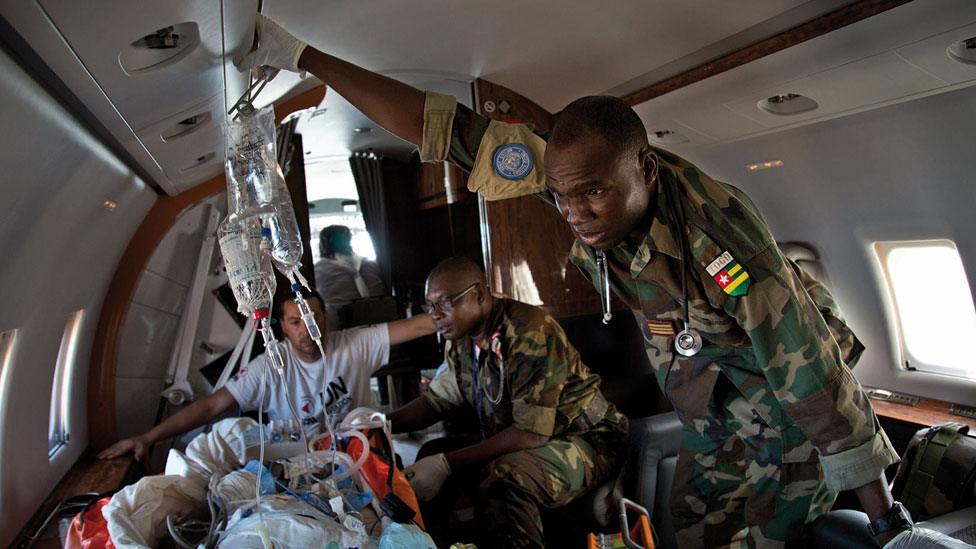
Mali (Minusma) - 53 deaths
Sudan (Unamid, hybrid mission in Darfur with African Union) - 48 deaths
DR Congo (Monusco) - 18 deaths
South Sudan (Unmiss) - 17 deaths
Ivory Coast (Unoci) - 16 deaths
Source: UN figures from 2013 up to 31 October 2015, excluding deaths from illness

Pilots from El Salvador fly armed reconnaissance helicopters; the Bangladeshis have brought boats for patrolling the Niger River and the Dutch with a drone, attack helicopters and special forces to gather intelligence.
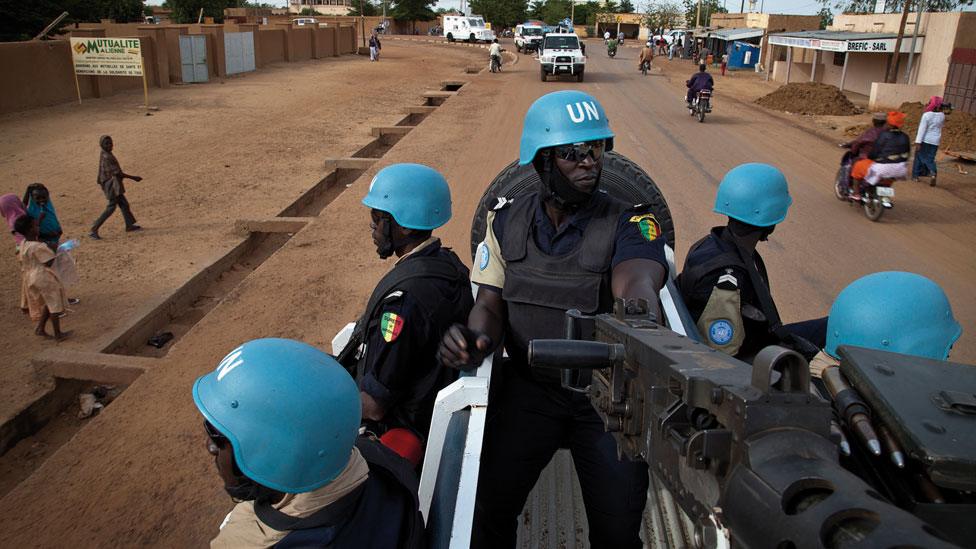
The UN took over the operation from a joint French and African mission in 2013
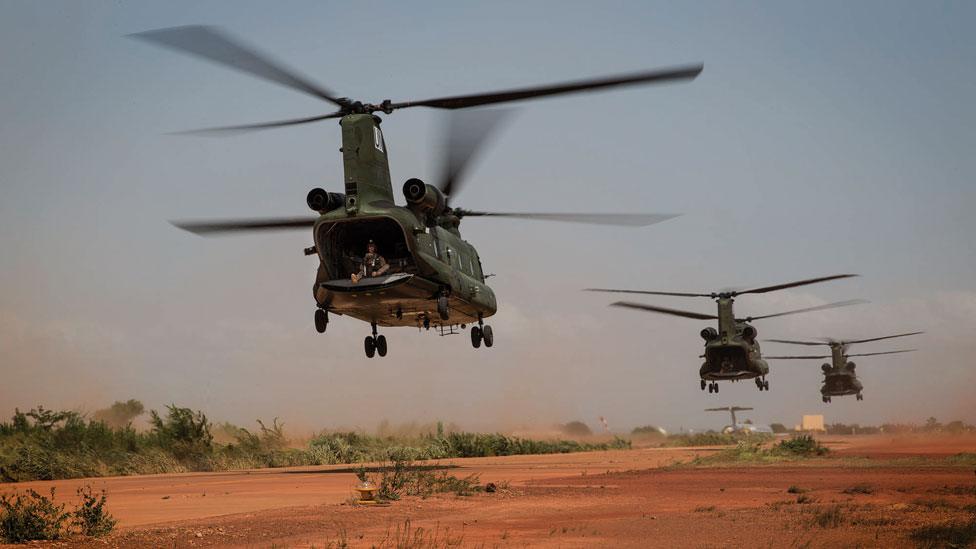
Peacekeepers have to deal with jihadist fighters, trafficking and smugglers
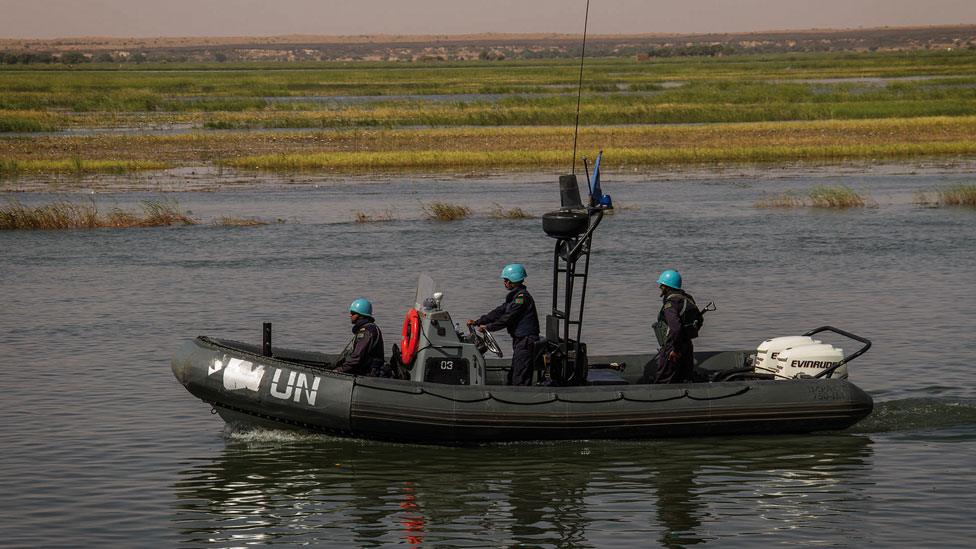
Swathes of Mali are barren but it is fertile along the River Niger
But it is troops from Mali's West African neighbours who make up the majority of the about 12,000 peacekeepers - soldiers, police and civilians - on the UN mission to Mali (Minusma).
There are certainly many dimensions to Minusma - the most dangerous of which is dealing with insurgents.
"Mainly it's mines and ambush - they are using asymmetrical warfare, and we have lost some brave peacekeepers," said Brigadier General Sidiki Daniel Traore, who commands the mission's western region, which includes Timbuktu.
"You have to deal with this by using new tools - like intelligence - we have threats due to terrorist armed groups but also criminality and banditry."
On joint foot patrols with Malian and UN police, and out in the communities day and night with the army of Burkina Faso, the strategy is similar to that in Iraq or Afghanistan - win hearts and minds, reassure the people and gather information.
And in most places they do seem largely welcome.
Before they arrived, Timbuktu was living under a harsh form of Sharia when Islamist militants occupied parts of northern Mali for nearly a year.
Jihadist videos
Everyone, from politicians, Tuareg groups, to those trying to sell trinkets to non-existent tourists - say security is the big problem.
But it is dangerous work.
More than 50 peacekeepers have died so far - and 200 have been injured.
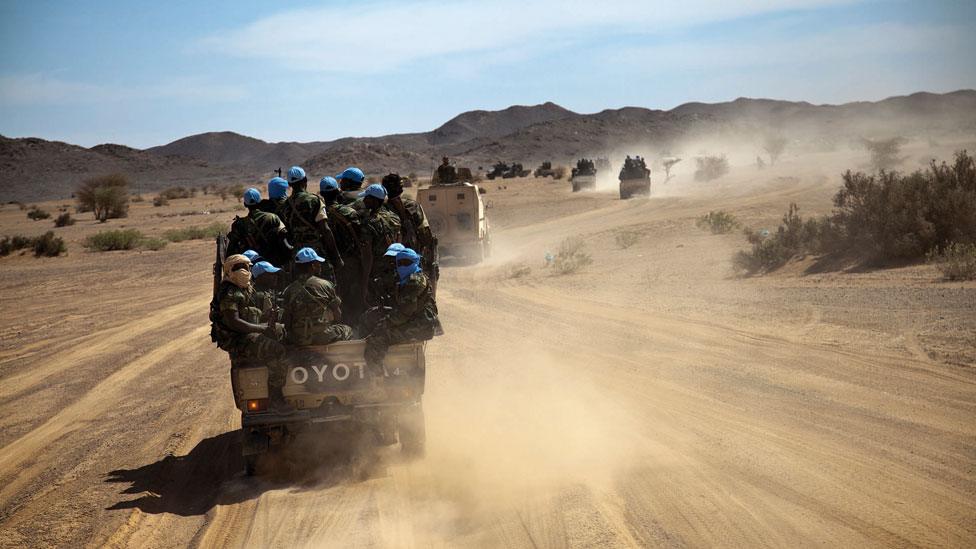
The peacekeepers have to secure a vast desert region
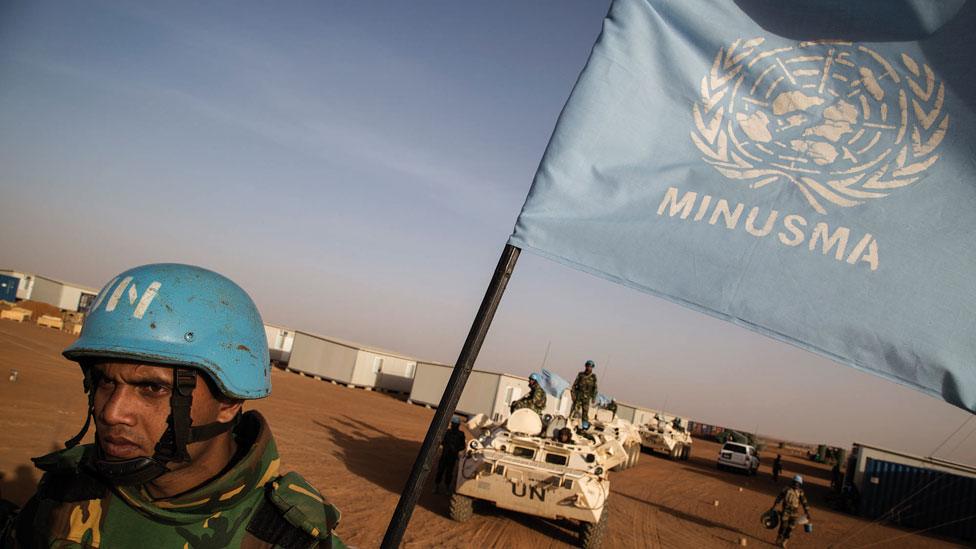
Minusma stands for the United Nations Multidimensional Integrated Stabilization Mission in Mali
One of the attacks on a UN convoy was filmed by jihadists who posted it online.
It shows a UN truck being hit by a rocket-propelled grenade; the bodies of some of the six peacekeepers killed in this attack are shown.
It is a video again reminiscent of those from Iraq or Afghanistan.
A UN source says these kind of direct attacks make it the most dangerous mission, skewing operations from peacekeeping to a war footing.
"When we have to deal with constant attacks, it makes it very hard to focus on core tasks such as political facilitation, protection of civilians, human rights promotion, monitoring and institution building," the source said.
The troops also have to deal with transnational crime and to political groupings who feel that this is the chance to enhance their negotiating posture.

Militancy in Mali
October 2011: Ethnic Tuaregs launch rebellion after returning with arms from Libya
March 2012: Army coup over government's handling of rebellion, a month later Tuareg and al-Qaeda-linked fighters seize control of north
June 2012: Islamist groups capture Timbuktu, Kidal and Gao from Tuaregs, start to destroy Muslim shrines and manuscripts and impose Sharia
January 2013: Islamist fighters capture a central town, raising fears they could reach Bamako. Mali requests French help
July 2013: UN force, now totalling about 12,000, takes over responsibility for securing the north after Islamists routed from towns
July 2014: France launches an operation in the Sahel to stem jihadist groups
Attacks continue in northern desert area, blamed on Tuareg and Islamist groups
2015: Terror attacks in the capital, Bamako, and central Mali

An intelligence official, who asked not to be named, told us at least one al-Qaeda linked group is on the outskirts of Timbuktu.
He said three others are being pursued elsewhere by French troops acting under a different counter-terrorist mandate.
But the "human map" shown to us - a who's who of militants, showing their connection to various armed groups, gangs and crime - has plenty of gaps.
Commanders and influential figures are often switching allegiance, moving from one jihadist group to another.
Some are currently split over whether to ally with the so-called Islamic State, or keep their connections to al-Qaeda.
It is causing instability within the groups and making them more unpredictable.
Empty library
The imam of the Grand Mosque in Timbuktu, Abdramane Ben Essayouh, said he used to be an optimist, but now he is a pessimist.
He unpacked some of his ancient manuscripts which were hidden from the destructive hands of the jihadists - like many others in Timbuktu, protected by the families who have guarded them for centuries.
Saving Timbuktu's ancient manuscripts
Two and a half years after they were driven from the city, the majority of his parchments and books are still stored in unmarked cardboard boxes - the dusty shelves in his library are empty.
"Security must be improved for everyone - for the people, and their property - but now they aren't safe to go shopping or to travel," he said.
The peacekeepers are trying, but this is a different type of mission for the UN.
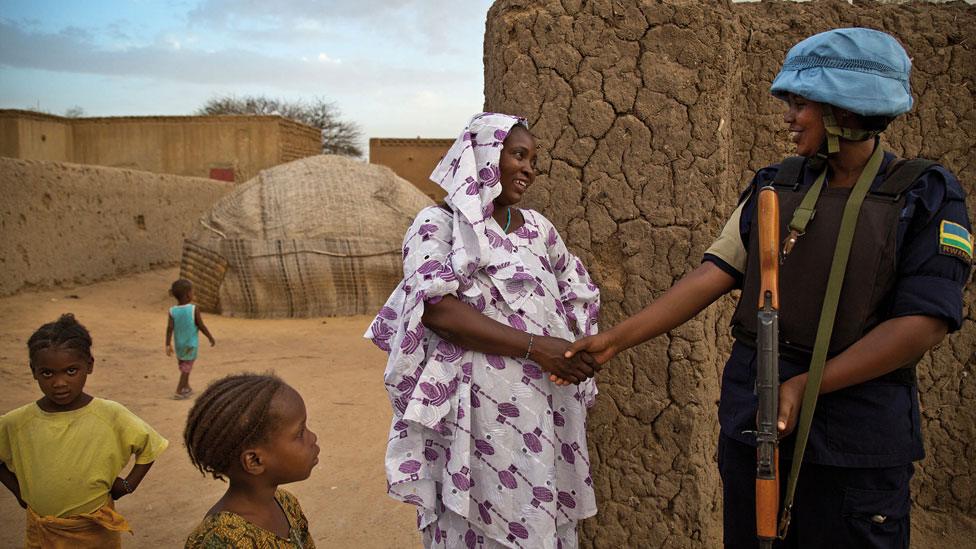
Winning hearts and minds is a key objective of the UN mission
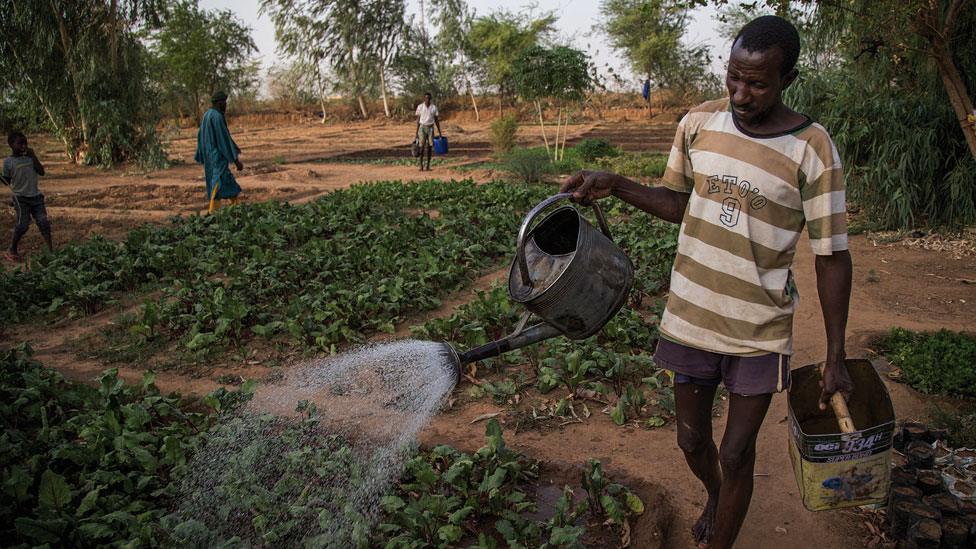
Key to ending instability in the north is developing economic opportunities for residents
Their key role is impartiality - and they have helped create enough space for militant groups to talk to each other and to the government and be part of an on-going ceasefire and peace deal.
But when they try to hit back against those planting bombs or launching ambushes, they get sucked into a counter-insurgency and the lines become blurred.
Crucial crossroads
The Danish commander of Minusma, Maj Gen Michael Lollesgaard, believes the UN will be increasingly engaged in more similar missions.
"Who else will do it?" he said.
"The UN is the global organisation and has the great legitimacy of being supported by more than 190 countries.
"Nobody else of the bigger organisations wants to engage themselves in these conflicts in, for example, Africa."
The ghosts of costly interventions in Iraq and Afghanistan have shaken the few countries like the US, which have the resources to carry out such missions alone.
He believes Mali is a crucial crossroads, and he would like to see more European nations making bigger contributions here.
"Seen from the European side, we have a lot of refugees coming up through Mali, we have a lot of drugs coming up through Mali," he said.
"Mali is important because it has a regional impact and a global impact on terrorism."